Late Talker vs. Speech Delay: What’s the Difference?

It’s common for parents to worry when their toddler isn’t talking as much as other children their age. While some children are simply late talkers, others may have a speech delay that requires professional support. Understanding the difference between a late talker vs. a speech delay is the first step toward getting your child the right help.
The Key Differences
A late talker is a child who speaks fewer words than their peers but shows no other signs of developmental issues. These children often catch up to their peers without any intervention. A speech delay, on the other hand, is when a child’s language skills are significantly behind their age group, and this delay is often a symptom of a larger communication challenge. A child with a speech delay may need professional intervention, such as speech therapy, to improve their communication skills.
Signs to Look For
Early intervention is crucial, so it’s important to know the signs of a potential speech delay. Here are some key indicators to watch for:
- Lack of Gestures: Your child isn’t using gestures like pointing, waving, or shaking their head to communicate.
- Difficulty Understanding: They have trouble following simple instructions or understanding what others are saying.
- Limited Babbling: By age two, they’re not engaging in babbling or sound play.
- Limited Vocabulary: They have a very small vocabulary for their age.
What to Do If You’re Concerned
If you have any concerns about your child’s speech development, it’s best to consult a professional. Paediatricians, speech-language pathologists, and early intervention specialists can assess your child and determine whether they’re a late talker or need support. Early intervention can make a significant difference in your child’s long-term communication skills, so it’s always better to seek advice sooner rather than later.
